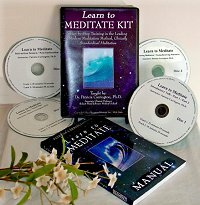Dr. Patricia Carrington's award winning meditation technique CSM (Clinically Standardized Meditation) is a clinically sensitive meditation method developed by the Medical Department of New York Telephone Company and used by numerous medical institutions, organizations, and individuals worldwide. For information click here.
The Mystery of the Mantra
The Admonition of Secrecy with Meditation
Patricia Carrington, Ph.D.
Author of “The Book of Meditation”
Many meditators, especially those who have learned TM, have been told by their teachers to keep their mantra absolutely secret. Some meditation teachers even imply that the revelation of your personal mantra will have dire consequences. They may have suggested that telling your mantra to someone else can ruin your meditation practice or rob the mantra of its effectiveness. Is there any truth in these warnings?
As with most complex matters, the answer is not a simple one. Certainly lightning won’t strike you dead if you reveal your mantra to someone other than your meditation teacher, nor will this act bar you permanently from benefiting from your meditation practice. But there are certain consequences of revealing your mantra to another that may make you voluntarily decide to keep it a communication private to your own self. Here are some of the reasons for this.
There is a sound psychological principle that suggests that we reserve the mantra as a special sound to be used only for meditation as much as this is conveniently possible to do. The mantra is regularly repeated while we are experiencing a deep sense of inner peace and therefore soon becomes what psychologists refer to as a ‘conditioned stimulus’ for peace and relaxation. That is, it becomes a personal signal to become tranquil and turn inward and thus can automatically bring about a relaxed state because it has been associated with such relaxation in the past. Using a mantra which is specially reserved for this purpose can be an effective way of ensuring that your meditation sessions will produce the tranquility that you seek.
There are ways, however, in which one can render a conditioned stimulus ineffective. One way is to repeat the stimulus under different conditions than the ones you desire to bring about. If, for example, your mantra were ‘Shanti’ (a Sanskrit word meaning ‘peace’) and you went about saying to others, ‘Please pass me the Shanti vegetables’; ‘May I have some Shanti ice cream?’; and ‘Let’s go to a Shanti movie’ (particularly if you used the word in a casual and superficial tone, not intended to deepen your awareness of the mantra), you might find that ‘Shanti’ had lost its significance for you – it would no longer be a signal to turn inward.
Another reason for not telling your mantra to a casual acquaintance or talking about it under conditions which are not genuinely serious or respectful is its highly personal nature. If you have a special mantra that has been assigned to you (or which you yourself have selected from a list of mantras) it eventually becomes a part of you. It can even symbolize your own identity. For some people, refraining from sharing this special word with others can therefore be an extremely important step toward inner independence. Such people may have always felt compelled to share everything they think or do with others. Their mantra now becomes one part of themselves that they can clearly call their own.

